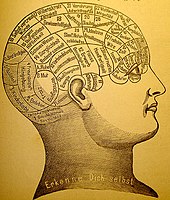
Photo from wikipedia
Psychiatric disorders are often described as disorders of the mind. Major depressive disorder (MDD), generalized anxiety disorder (GAD), obsessive-compulsive disorder (OCD), and posttraumatic stress disorder (PTSD) are categorized by varying… Click to show full abstract
Psychiatric disorders are often described as disorders of the mind. Major depressive disorder (MDD), generalized anxiety disorder (GAD), obsessive-compulsive disorder (OCD), and posttraumatic stress disorder (PTSD) are categorized by varying degrees of psychomotor, cognitive, affective, and volitional impairment (1). Many explain them in psychological terms without referring to an underlying neural substrate (2). This position may be traced to Freud's failed attempt to link neural mechanisms to psychodynamic concepts in his Project for a Scientific Psychology. It led him to abandon neurology in favor of psychoanalysis (3). Karl Jaspers later stated that biological and psychological investigations of the mind are like “the exploration of an unknown continent from opposite directions, where the explorers never meet because of the impenetrable country that intervenes (4).” Jaspers was not endorsing substance dualism, the theory that brain and mind are ontologically distinct material and immaterial substances (5). He wasmaking an epistemological claim, noting that we have an incomplete understanding of the brain andmind and how they interact. Some contemporary psychiatrists seem to interpret the idea of biology and psychology coming from “opposite directions” as suggesting an epistemological and explanatory dualism between neural andmental processes. This appears to be part of an “identity crisis” in psychiatry reflecting disagreement about characterizing psychiatric disorders as disorders of the mind or brain (6). Dualism as such does not preclude mind-brain interaction. But it supports the position that mind and brain can be functionally distinct. I argue that this is not consistent with neuroscience research showing the extent to which mental and neural processes are interdependent and influence each other in maintaining mental health or causing mental illness. Dualistic thinking of the type I have described can limit therapeutic interventions for patients suffering from major psychiatric disorders.
Journal Title: Frontiers in Psychiatry
Year Published: 2020
Link to full text (if available)
Share on Social Media: Sign Up to like & get
recommendations!